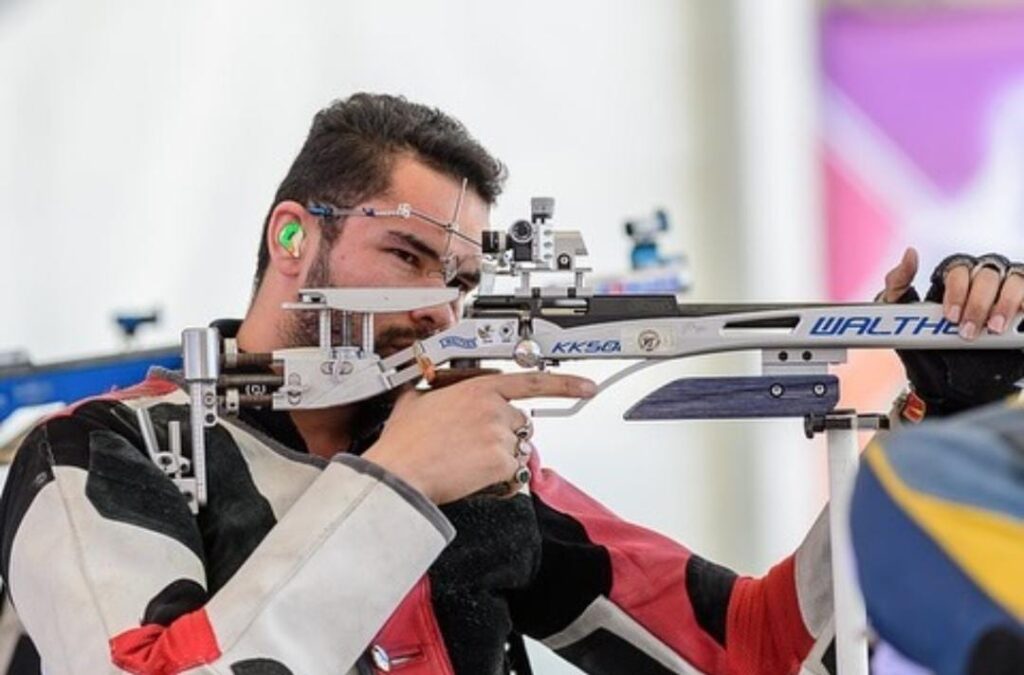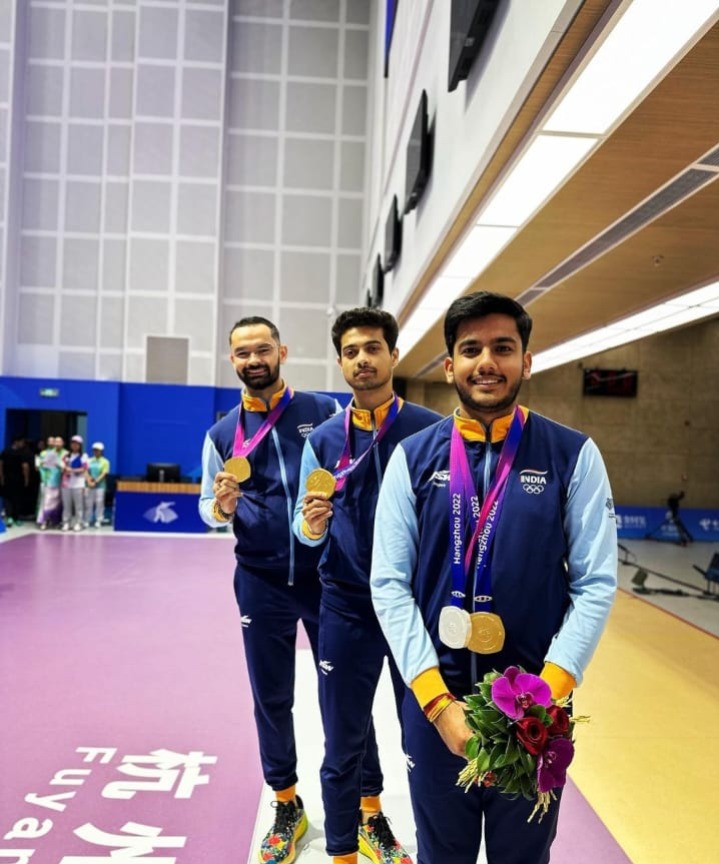
A RevSportz Exclusive
After London 2012, India have not managed to win a shooting medal at the Olympics. Till date, there have been only four shooting medals in India’s Olympics tally. But in recent times, once can see a revolution in Indian shooting. The Hangzhou Asian Games was one example of how the Indian shooters are now up there on the global stage. Out of the 22 medals the shooting contingent won in Hangzhou, Akhil Sheoran won a gold medal in the Men’s Rifle 50m 3-Position Team event. He then won a Paris Olympics quota by winning bronze at the Baku World Championships 2023, in the same category.
Journey
It all started for Sheoran in 2008, when Abhinav Bindra won the gold medal at the Beijing Olympics in the 10m Air Rifle event. Sheoran’s school celebrated the victory, and he was introduced to the sport during that time. His parents wanted him to pursue sport because it would help in securing a government job. Later on, he got a government job through the sports quota in shooting, but that was not enough for the shooter from Uttar Pradesh to settle down. He made it to the national team in 2012, and since then, shooting has been his career.
In an exclusive chat with RevSportz, Sheoran spoke about his performance in the recently concluded trials in Delhi and how he was looking forward to the final trials in Bhopal. He talked of his Olympics dreams, the journey, the shooting environment in the country and more.
Here are the excerpts from the conversation:
In the Delhi trials, Sheoran came third in Trial 1, with a total score of 589-34x, and in Trial 2, he came fifth with a total of 584-38x.
Q: Based on the Delhi qualifiers, how do you look at your performance and how do you look forward to the Bhopal qualifiers?
Sheoran: Yes, the Bhopal trials are very important for me and also for the entire contingent trying to qualify, because the rule says you have to play four trial rounds and you can eliminate two of your worse scores. So, after Delhi, Bhopal becomes a lot more important for me. But if you see, in Delhi, almost everyone’s one match was poor. So, everyone has to play the Bhopal trials well, and the competition will be tough.
Q: What do you think went wrong in Delhi and what are the areas to be improved?
Sheoran: Nothing went wrong as such. I had a small injury 15-20 days before the trials. I was fine during the trials, but as you can understand, the training was not enough. Now I am fit and got the practice I needed. Bhopal will be better. Otherwise, the technical aspects are in place.
Q: How was the overall mood in the camp? What was the talk among yourselves?
Sheoran: Well, it was an evenly toned mood in the camp. Everyone was in their zone, focusing on their events but also greeting each other and sharing tips and experiences after their rounds. I can speak for the 50m team, we do have a healthy environment among ourselves.
Q: In Hangzhou, when we spoke to several shooters, and learnt about a simulation training module during the training sessions. Now also, you all are having something similar?
Sheoran: Well, yes! The range here in Delhi is a windy range. It is helping us get used to a windy range, because especially in 50m, windy-range situations are difficult. The shot position gets affected by wind. So, we have a simulated range here and we are also using different types of ammunitions. We also have a modulated physical training routine. The entire training scenario is designed so that we are prepared for any type of situation on the big stage.
Q: Do you have any specific training regime for yourself?
Sheoran: Nothing in particular. But I do have a good routine and a very good management team who help me in every way. I start my day with yoga and meditation, which are extremely important for a shooter. It helps in regulating my breathing and also flexibility. In the evening, we have strength-and-conditioning sessions with focus on shooting’s requirements. We also have a ‘psychology team’ that trains us to be mentally fit and ready for competitions. So, all bases are covered and nothing more we can ask for.
Q: What do you do apart from shooting?
Sheoran: I go for running and long walks. Especially when I am down, or something is bothering me. Long two-hour walks. This helps me to think and reflect back on the situation, as to what went wrong and what needs to be done. Apart from this, I organise my room, especially my shooting cupboard. This helps me maintain my peace of mind.
Q: After the Hangzhou performance, the expectations, especially from the shooting team, have risen. How do you see it? Is it added pressure?
Sheoran: Yes, as you said, Hangzhou was a great campaign for us. It was an important competition, but the Olympics is at a different level. Asian Games was a level that we have achieved, but we also got a reality check on the areas to be improved. We have been working on them since then. After Hangzhou, we had participated in several competitions, and we have proved ourselves mentally and physically also. For Paris, we are not doing anything special, but trying to be a better version of ourselves every day. We are just sticking to the basics and the target is to bring perfection in it.

Q: After Hangzhou, what has changed for you individually?
Sheoran: Hangzhou was a good experience for me, but if you remember, I was not able to participate in the final because only two members were allowed to participate from the same country. This incident gave me a hunger for finals, to be honest, and after that, whichever final I have played, I have won. I am keeping that hunger within me and will try to keep it till Paris and beyond.
Q: What is the target you have set for yourself in the coming weeks?
Sheoran: Qualifications are the main focus now. Once you get through, then it’s all a process that will happen automatically. I am confident with the finals. Currently, the main focus is the qualifiers. The only difference is that, in finals, you have to shoot 15 shots and in qualifiers, 20. So the position switch-over time is short. But we are preparing for it, so it’s not a problem.
Q: Have you played in Paris before?
Sheoran: Yes, we had a camp and a small friendly competition where shooters from three-four other countries also participated. It was held at the venue where the Olympics finals will be held, so yes, we do have some experience of the conditions.
Q: After 2012, we have not won a shooting medal in the Olympics. But in recent times, we have had several good shooters who have proved themselves on the global stage. It’s a shooting revolution. How do you describe it? What is the future?
Sheoran: Well, for the recent future, I can say that each shooter is preparing for a podium finish. And for the revolution, I give credit to the elite shooters of that generation who have now become coaches, like Jaspal Rana, Dipali Deshpande, who is my personal coach, Suma Shirur, Manoj Kumar and others. They are great coaches who share their experiences and guide us. I guess this is the main reason that has created a difference.
There is serious involvement from the administration also. There is focus and investment not only in physical fitness, but also mental fitness of the athletes. The federation understands the importance of these aspects. There is a system in place that is helping the athletes perform well. Gagan Narang is my idol, and I follow him a lot. He has taken charge of the shooting contingent for Paris, and is doing a great job.
The interview by the writer with the 50m Rifle 3P team during Hangzhou Asian Games:
EXCLUSIVE🚨
The champions of the 50m Rifle 3 Positions event, Aishwary Tomar, Swapnil Kusale, and Akhil Sheoran, share their thoughts on securing GOLD in this exclusive conversation with @TheRohan22.@AgeasFederal @OfficialNRAI #AsianGames2022 #IndiaAtAsianGames pic.twitter.com/XJvrfzh1jj
— RevSportz (@RevSportz) September 29, 2023